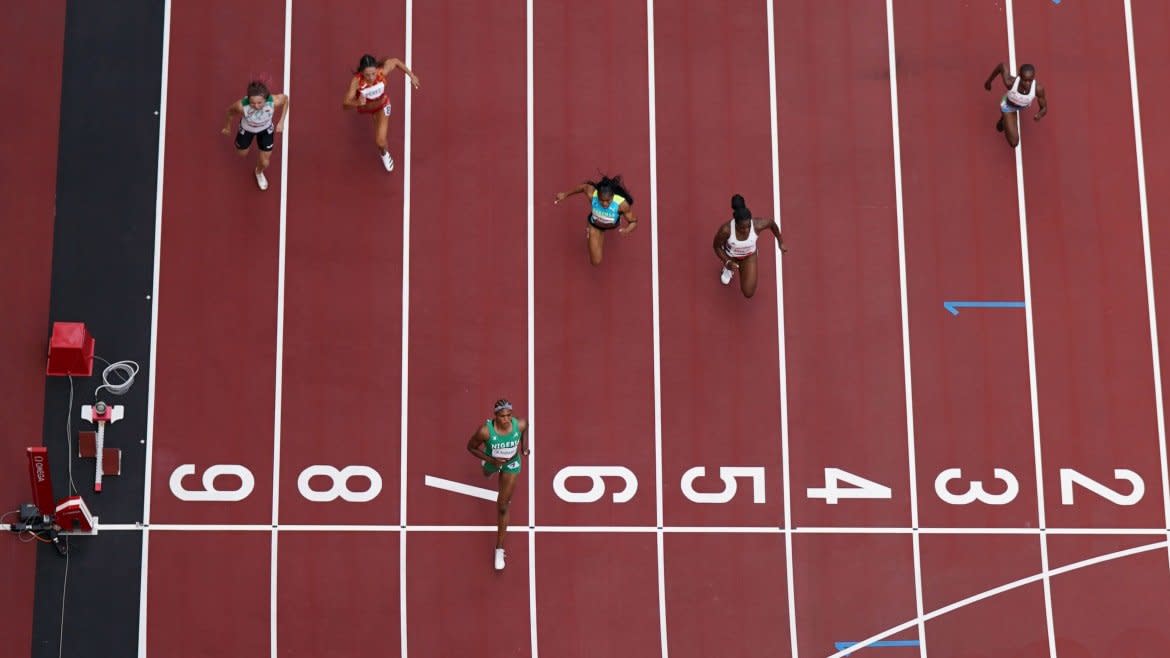‘You Will Dominate’: Texts Reveal Texas Naturopath’s Role in Olympic Sprinter’s Doping

A Texas therapist who specializes in natural remedies has been arrested by the FBI in the first case under the U.S.’s new anti-doping act. Eric Lira is accused of peddling performance-enhancing drugs to two athletes during the 2020 Tokyo Olympics.
Court documents unsealed Wednesday charged Lira with violating the Rodchenkov Act, which went into effect in December 2020 and was named after a Russian doping whistleblower. The act bans the marketing and selling of prohibited substances in international sports competitions, including the Olympics.
Lira allegedly supplied performance-enhancing drugs during the Games, which were held in 2021, to two athletes identified in a criminal complaint only as Athlete-1 and Athlete-2. Based on several identifiable details, Athlete-1 appears to be Nigerian runner Blessing Okagbare, who was suspended for doping just hours before her Olympic 100-meter semi-final in July.
Lira’s alleged scheme came undone after Athlete-1 tested positive for human growth hormones, the criminal complaint says. In addition to physical evidence of prescription bottles and vials, a damning series of encrypted text messages between Lira and Athlete-1 were allegedly uncovered when the athlete was stopped by border officials on her way back into the U.S. from Tokyo.
Russia Melts Down: U.S. Rigged Olympics to Steal Our Golds
In the messages, Lira—a self-proclaimed “kinesiologist and naturopathic” based in El Paso—seemingly recommended the use of misbranded human growth hormones and the blood-building drug erythropoietin that he’d sourced from Central and South America.
In one message cited in the complaint, Athlete-1 forwarded a link to Lira of a website that specialized in performance enhancing drugs. In others, they discussed doses of “honey,” mentioned prohibited hormones, and used coded language for other drugs.
“This one is giving me a hard time to use too…I have mixed it but it’s not setting right like the Genotropin.4 I don’t want to waste it,” the athlete wrote, according to the complaint.
In another message listed in the complaint, she texted Lira, “I had a bad race yesterday, Eric. …Upset, angry, and disappointed…You have L arginine injection?”
Then on June 22, 2021, the complaint says she texted Lira, “Hola amigo / Eric my body feel so good / I just ran 10.63 in the 100m on Friday / with a 2.7 wind / I am sooooo happy / Ericccccccc / Whatever you did, is working so well.”
The athlete messaged Lira again in June asking if it was OK to take a drug test after taking a dose of one of the prescribed medications, the filing says. Lira said that it was a small dose and should have been fine. However, she did not end up taking the test.
On July 19, 2021, the complaint says, Athlete-1 asked for any final suggestions before leaving her training in Slovakia for the Tokyo Olympics.
In response, Lira allegedly wrote, “What you did… is going to help you for the upcoming events. You are doing your part and you will be ready to dominate.”
That same day, the athlete participated in a blood test conducted by the Athletics Integrity Unit, which made sure that athletes were not taking banned substances before the Olympics, the complaint states. Then on July 30, she messaged Lira to say her test came back positive for a human growth hormone. The complaint says she was suspended from the 100m women’s semi-final on July 30 just before the race, and banned from competing for several years.
While the filing doesn’t name Okagbare, ESPN reported that the sprinter tested positive for a blood booster in June 2021 and a growth hormone in July 2021. Okagbare sprinted the 100m in 10.63 seconds on Friday, June 18, 2021, and she was also barred from competing in the 100m just hours before the race on July 30.
COVID-19, the Bear, and Simone, Oh My: The Wildest Moments of the Weirdest Olympics in History
The complaint filed against Lira alleges that Athlete-1 also recommended the naturopath to another athlete.
“Remember I told you [Athlete-2] had hurt his hamstring, so anything that will help the hamstring really heal fast you can actually bring it as well, ok?” she allegedly wrote in a June 7 message.
The FBI was alerted about Athlete-2’s possible doping through an unnamed informant who was sent to the athlete’s Florida apartment to collect some belongings in July, while Athlete-2 was out of the country training for the Olympics. Instead, the person found packages from Lira with prescription bottles and injection needles with labels written in Spanish, the complaint says. The person took photos of the items and forwarded them to the FBI.
Lira is not listed as a licensed pharmaceutical prescriber in Texas, New York, or Florida—states where he is accused of practicing. In addition to violating the Rodchenkov Act, Lira has been charged with supplying or delivering misbranded drugs or food between November 2020 to July 2021.
If convicted, he faces up to 10 years in prison for violating the Rodchenkov Act and five for the drug offenses.
Get the Daily Beast's biggest scoops and scandals delivered right to your inbox. Sign up now.
Stay informed and gain unlimited access to the Daily Beast's unmatched reporting. Subscribe now.

